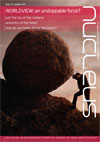The previous worldview articles in this issue of Nucleus describe what a worldview is, and remind us of the basic components of the Christian worldview. We've also explored the way that we make decisions. To academic minds, it can be surprising how few of our actions come primarily from reason and thought, and how much is driven by gut instinct.
When we don't realise this, we can easily think that worldview is a rather cerebral subject, useful in debate or research, but not really relevant to us. But when we realise that most of our actions are driven by intuition, rather than careful thought, we realise that understanding someone's worldview (and the driver of their intuition) is the only way we will really understand their actions, and the values that underlie them.
The political turmoil of 2016 revealed a world in which there is very little mutual understanding between people with differing views. Gone are the days (if they ever existed) when someone you disagreed with was assumed to be honourable, but mistaken. The vitriol expressed in the UK's EU referendum and the presidential election in the USA showed that, for many, there was little understanding of the perspective of people who voted in a different way. For example, it wasn't just that a Trump voter disagreed with a Clinton voter; it was that some Trump voters couldn't understand how anyone could ever vote for Clinton without having deficient moral values.
We can be in much the same position when Christian and non-Christian worldviews collide. Take debates on sexuality. It can seem impossible for a Christian to convey that they are still loving towards a same-sex couple if they don't believe that it is right for them to marry. Or on abortion - will a pro-choice activist see that a Christian pregnancy counsellor wants to be caring when discussing a woman's options in the face of an unwanted pregnancy, or are they more likely to assume that the counsellor is infringing on the woman's autonomy?
We might well be able to justify the difference between Christians and others by simply saying that Christians base their actions on the Bible and others don't. But this may be too simplistic. For major life decisions many Christians will seek guidance in prayer, scripture, and the counsel of other believers. But most of our decisions are not like this. Did you pray and search the scriptures before deciding what colour socks to wear this morning? for many day-to-day decisions, Christians might well be using the same moral bases as everyone else. and of course there are plenty of questions where Christians don't all agree. Christian groups campaigned on both sides in the EU referendum. (1)
Moral foundations
One way of understanding these 'disconnections' is to look at something called 'Moral foundations theory'. Developed by a group of social and cultural psychologists, it aims to understand why morality varies a great deal across different cultures, yet still holds many common themes. More detail can be found at www.moralfoundations.org, and in Jonathan Haidt's book The Righteous Mind. (2)
Moral foundations
1) care/harm
This foundation is related to our long evolution as mammals with attachment systems and an ability to feel (and dislike) the pain of others. It underlies virtues of kindness, gentleness and nurturance.
2) fairness/cheating
This foundation is related to the evolutionary process of reciprocal altruism. It generates ideas of justice, rights and autonomy.
3) loyalty/betrayal
This foundation is related to our long history as tribal creatures able to form shifting coalitions. It underlies virtues of patriotism and self-sacrifice for the group. It is active anytime people feel that it's 'one for all, and all for one'.
4) authority/subversion
This foundation was shaped by our long primate history of hierarchical social interactions. It underlies virtues of leadership and followership, including deference to legitimate authority and respect for traditions.
5) sanctity/degradation
This foundation was shaped by the psychology of disgust and contamination. It underlies religious notions of striving to live in an elevated, less carnal, more noble way. It underlies the widespread idea that the body is a temple which can be desecrated by immoral activities and contaminants (an idea not unique to religious traditions).
The basic idea is that several innate and universally available psychological systems form the basis of 'intuitive ethics'. these systems effectively form the 'elephant' that is discussed in the previous article [page 8]. The systems proposed are shown in the box.
These five foundations have the most evidence. Haidt suggests that 'liberty/oppression' would be a good candidate for a sixth.
If we come back to the example of sexuality, we begin to see how people who emphasise different foundations may hold very different values. It is possible to discern what emphasis someone places on each of these foundations via their responses to a number of questions (you can try it for yourself at www.yourmorals.org).
Those who hold politically 'liberal' opinions, and argue for liberal positions on sexuality, tend to score highly for 'care/harm', and 'fairness/cheating'. those who hold these positions are likely to want to avoid suffering for anyone, and be very careful of not hurting the feelings of an individual. If a 'liberty/oppression' foundation is included, this is also strong in those of a liberal persuasion, and is usually associated with a strong emphasis on autonomy.
But those who hold more 'conservative' opinions are likely to score much higher than 'liberals' on authority, loyalty and sanctity. the sanctity of marriage and the authority of the Bible are likely to be emphasised, along with loyalty to historical patterns of sexual acceptability. Those of this persuasion still score well on care/harm and fairness/cheating values - the big difference is in the emphasis given to the others.
When we analyse our differences over sexual ethics at this level, we see that both sides are motivated by moral principles, and that both are trying to do the right thing. The difference is in the emphasis placed on different underlying principles. The problem is that these underlying principles are rarely considered, and hence a Christian emphasising sanctity often comes across as uncaring, because the 'care/harm' principle isn't heard. More detail about how this works for the specific example of sexual ethics can be found in a Triple Helix article from 2015 by Professor Glynn Harrison. (3)
In his book Haidt suggests that loyalty, authority and sanctity appear to be much more widely emphasised outside the USA and Europe. Someone who emphasises these values is more likely to see themselves in the light of their roles within their family or society, as opposed to someone who doesn't see them as important, who is likely to be more individualistic. This may help us understand why Christians from different cultures emphasise different things.
Where (if at all) do moral foundations fit into scripture?
It is interesting to think whether the moral foundations suggested have any basis in scripture. These foundations don't attempt to lay down rules; they merely describe what people think.
Of course the idea that most people share the same principles, even though different emphases are given, could suggest a common starting point. Some may explain this via evolution. But I think that all of the moral foundations proposed could be supported at least in part by scripture. Might we perhaps see them as remnants of the image of God, still present in humans even though fallen?
If the Bible is God's revelation, surely it is primarily from there that we should derive our worldview, moral principles and ethics. It is not quite as simple as 'do what the Bible says', even though this may be true as far as it goes. How do we determine what the Bible says, particularly on topics that are not addressed explicitly?
How do we use the Bible in ethics?
If many of our judgments come from intuition, do we actually use the Bible in ethics at all? Of course we do. Much of the time, the effect of God's Word on our decisions will be in the way it has changed our heart over time. We've already discussed the importance of the heart in John Greenall's article [page 8]. We have not only the promise that in the new covenant God will put his law in our minds and write it on our hearts, (4) but the instruction that we will be 'transformed by the renewing of our minds' (Romans 12:2) when we conform to God's pattern rather than the world's. But for us to know God's pattern, to gradually conform to it, we must know how the Bible should shape our actions. This is a deep and profound subject, which is worthy of more detail than we can give here. I would commend Matt Lillicrap's treatment (Nucleus Summer 2010 (5) and 2011 (6)), or for a more detailed treatment take a look at a number of articles on our Turning the Tide webpages. (7)
However, we do have space here for some helpful hints!
Remember the whole of scripture. Of course we should seek specific verses that help us know what to do in a given situation. But a few words can mean almost anything out of context. We need to have an idea of where a particular verse or passage fits into the whole picture of scripture - described briefly in the first article, or at more length in books like God's Big Picture. (8) If we cite an Old Testament law in support of a particular action, we need to think how it applies in the new covenant. Even if it no longer applies directly, what can we learn about God's character from it? We can only do this with a good understanding of scripture. Have you read every word of the Bible at least once? More than once? The Bible is authoritative as originally given. No one particular translation has a monopoly over all the others. It is wise to use more than one translation if in doubt over something, and look at commentaries that have been based on original language texts.
Lots of stories are recorded in the Bible. Remember that not every action is affirmed. Yes, David was a great leader who we might want to emulate in part, but this doesn't mean that we should follow his example of adultery with Bathsheba. (9)
Conclusion
Understanding the Bible better is undoubtedly a vital part of the process of conforming to God's will, but it isn't the only part. I hope we've seen here how deep the underlying assumptions that drive our worldview can be. Much of the time, we are steered by the 'elephant', with our rational minds justifying the actions we've already taken, rather than planning them out.
The only way we (and others) will change the actions of the elephant is via a radical change of heart. Only through God working in us, through his Holy Spirit, will we see the shift in our moral foundations and intuitions needed for them to become more like his.
































